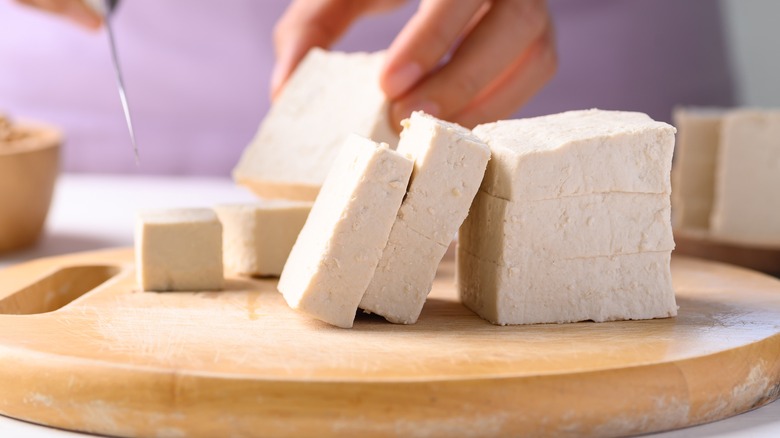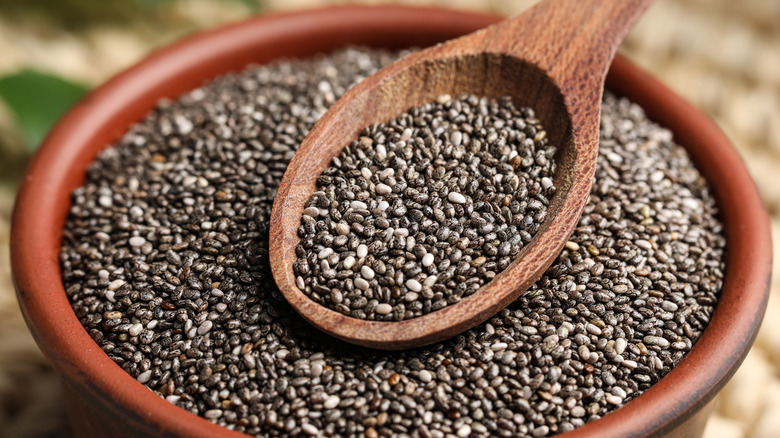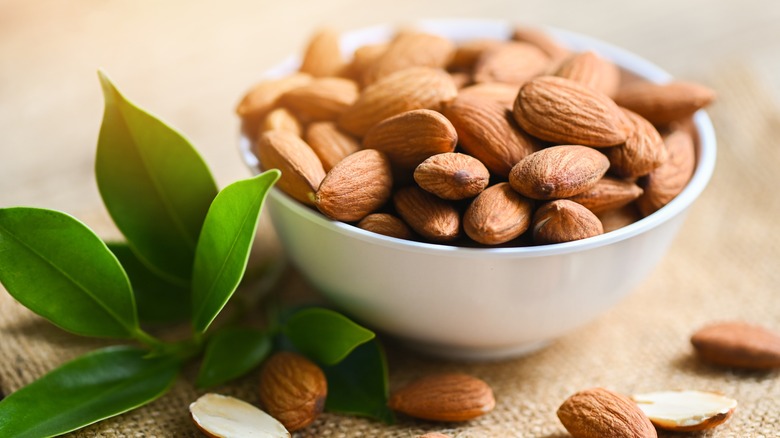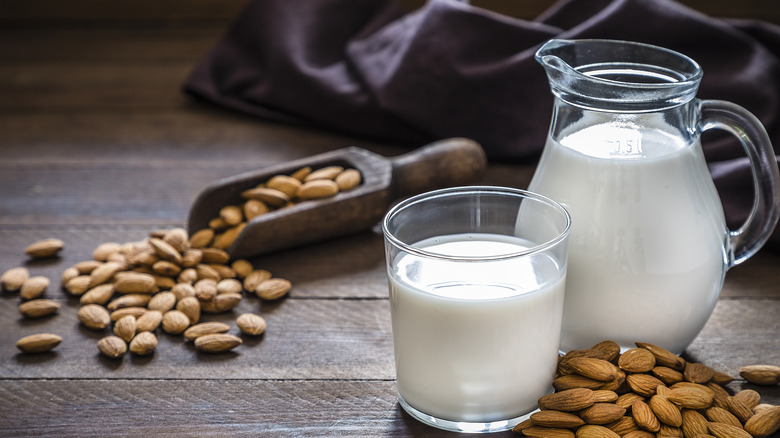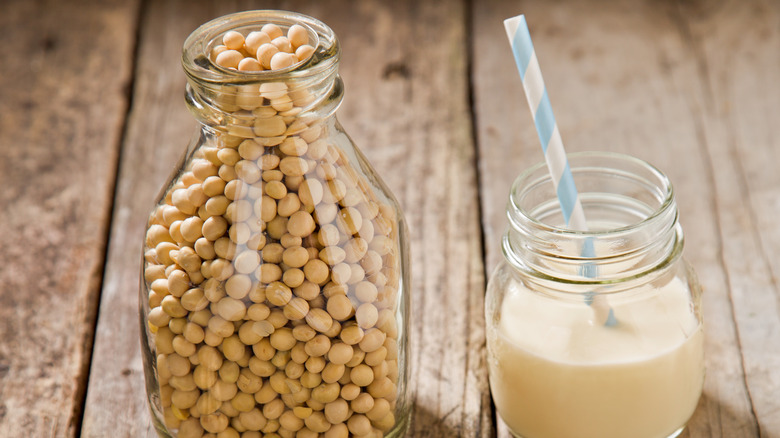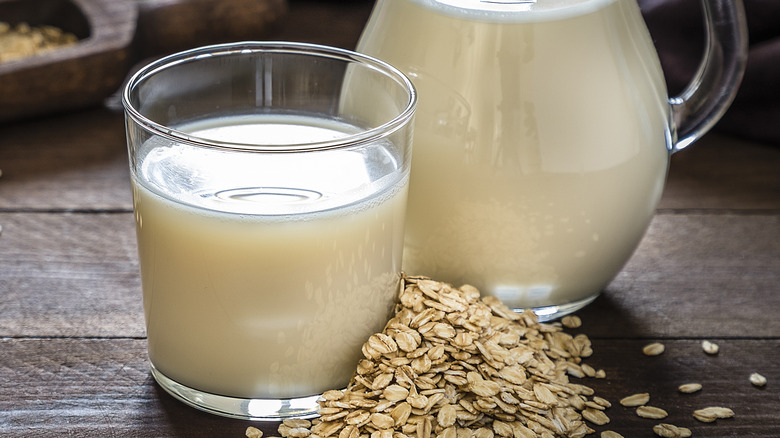These 13 Unexpected Foods Are Higher In Calcium Than A Glass Of Milk
Calcium plays a fundamental role in maintaining the health of your bones and teeth, supporting muscle function, and facilitating the transmission of messages within your nerves (via the National Institutes of Health). In fact, it is so important that it is the mineral present in the largest amount in your body. While popular belief has led many to accept that a glass of milk is the ultimate calcium powerhouse, the truth is far more diverse and surprising. In fact, several foods, including some unexpected plant-based sources, boast an even higher calcium content than a cup of milk, making them excellent alternatives for vegans, vegetarians, and those who are lactose intolerant.
Milk, a standard reference point with its 309 milligrams of calcium per 245-milliliter cup (per the USDA Food Data Central), is merely the tip of the iceberg when it comes to meeting your daily calcium needs, providing 24% of the mineral's Daily Value (DV), or the recommended amount of calcium you should consume each day (per the Food and Drug Administration). From leafy greens like kale to plant-based milks, seeds, and fish, this article will unveil a plethora of natural sources that can power-pack your diet with this essential mineral. Keep reading to explore the vast array of foods that not only match but surpass the calcium content found in a glass of milk.
Mozzarella cheese
Mozzarella cheese, known for its creamy texture and mild flavor, offers a delectable fusion of taste and health benefits. It stands out as a calcium powerhouse, with a mere 245-milliliter cup packing a whopping 1.7 grams, equivalent to 130% of the DV for this mineral (per USDA Food Data Central). Plus, mozzarella's health-conscious consumers will be pleased to know that it's not only rich in calcium but also offers a hearty dose of protein while keeping calories and fat in check, particularly when compared to other hard cheeses. Furthermore, it is also a good source of conjugated linoleic acid (CLA), a component that has been associated with reducing oxidative stress and potentially boosting your body's immune system (via Nutrition Advance).
Beyond its nutritional prowess, mozzarella's authentic Italian nature comes in two primary forms, each catering to distinct preferences and culinary needs. Fresh mozzarella is a delicate, perishable delight, best enjoyed within a few days of production. On the other hand, aged mozzarella varieties boast a longer shelf life and a bolder, more pronounced flavor profile, thanks to the aging process (per Encyclopedia Britannica). Fresh mozzarella is often found in Caprese salads and pasta dishes. In contrast, aged mozzarella is a staple in pizzas, sandwiches, and casseroles, where you're looking for a cheese that melts to perfection.
Firm tofu
Firm tofu, a nutritionally dense food, offers plenty of health benefits and culinary uses. Starting with its calcium content, it effortlessly surpasses that of milk by packing over five times the amount of the mineral per cup, amounting to 130% of the DV (via USDA Food Data Central), meaning that it stands as a remarkable source of this vital mineral for bone health. However, firm tofu's calcium count may vary depending on the type of coagulant used to create the blocks. Notably, the use of calcium coagulants results in tofu with an even higher calcium content (per Healthline).
Beyond its calcium prowess, tofu is famous for being a rich source of protein that boasts all essential amino acids, making it a complete protein source akin to eggs or chicken. Additionally, it contains isoflavones, a group of antioxidants attributed to various health benefits. In fact, tofu consumption has been linked to a reduced risk of cancer, diabetes, and heart disease thanks to its high isoflavone content. Tofu's positive impact also extends to bone and brain health, making it a valuable addition to one's diet (via Healthline). While you may also find softer tofu varieties like silken or regular tofu, firm tofu seamlessly integrates into a myriad of dishes, and it's popularly used as a meat replacement in tacos, lasagna, or bowls (via the Cleveland Clinic).
Chia seeds
Though chia seeds might be tiny, they have earned their superfood status due to their nutrient-rich nature and culinary applications. Packed with 1.5 grams of calcium per 245-milliliter cup, they provide 119% of the DV for the mineral (per USDA Food Data Central), compared to milk's 24%. Furthermore, being rich in fiber, protein, and heart-healthy fats like omega-3 fatty acids, these seeds are a nutrient treasure trove (per Healthline).
Chia seeds' impressive list of potential health benefits starts with their high antioxidant content, which helps your body combat the harmful effects of oxidative stress. Also, chia seeds play a pivotal role in promoting satiety and aiding weight loss due to their high fiber and protein content, which can increase feelings of fullness and reduce overall food intake. Moreover, their fiber and omega-3 fatty acids contribute to heart health by helping lower cholesterol levels and reducing high blood pressure, thereby decreasing the risk of heart disease. Culinarily speaking, chia seeds' versatility shines even more, seeing that they are excellent for thickening sauces and can serve as a vegan-friendly egg substitute in recipes. You can also sprinkle them on top of fruit, cereal, or yogurt, or blend them into smoothies and baked goods to enhance their nutritional content.
Calcium-fortified orange juice
According to the World Health Organization, fortification is a practice aimed at enhancing the nutritional content of foods to support public health with minimal health risks. Thus, calcium-fortified orange juice is orange juice with calcium added to it to ensure that you get the calcium your body needs in case you're not getting it from other sources. This is because, according to WebMD, orange juice is the most widely consumed fruit juice globally. Therefore, a 245-milliliter cup of calcium-fortified orange juice packs a significant punch, providing 1 gram of calcium, equivalent to 82% of the DV for this mineral (per USDA Food Data Central). In addition, orange juice is rich in vitamins C and A, iron, and folate, making it a well-rounded nutritional choice.
Moreover, Healthline adds that besides vitamin C, orange juice contains other antioxidants like flavonoids and carotenoids, making it a champion against free radicals and oxidative stress. Furthermore, orange juice's ability to alkalize urine (increase your urine's pH levels) may help prevent the formation of kidney stones, and that its consumption has been linked to reducing risk factors for heart disease (e.g., high blood pressure and cholesterol levels). In the culinary realm, whether calcium-fortified or not, orange juice is a versatile ingredient, adding a sweet yet tangy twist to various dishes. For example, it serves as an excellent base for dressings and marinades, enhancing flavors with its citrusy zing; it also provides moisture and a delightful orange essence to baked goods.
Canned sardines
Canned sardines are treasures in tin cans that offer convenience with a plethora of health benefits. With a remarkable 936 milligrams of calcium per 245-milliliter cup, accounting for 72% of the DV, these tiny fish can significantly contribute to your daily calcium intake (per USDA Food Data Central). Plus, according to Medical News Today, they're quite high in omega-3 fatty acids, which are celebrated for their role in reducing the risk of heart disease and potential benefits in preventing cancer, Alzheimer's disease, dementia, and other brain-related conditions. Additionally, packed with protein, selenium, and vitamin B12, canned sardines provide plenty of essential nutrients. And the cherry on top is that they are among the safest fish to consume due to their low mercury content.
You may find canned sardines in various liquids like water, oil, or tomato juice, and their versatility in culinary applications is vast. You may add canned sardines to pastas, salads, spreads, sandwiches or toasts, and countless rice-based dishes like paella or fried rice, enhancing their flavor with onions, peppers, or condiments such as mustard, mayo, or hot sauce. And if you're in a hurry, you can savor them straight from the can. And don't worry about eating the skin or bones, as that is where some of their health benefits come from.
Canned salmon
With 53% of the DV for calcium per cup, canned salmon doubles the calcium content of milk (per USDA Food Data Central). Nonetheless, its benefits extend far beyond calcium, as it's a rich source of other key nutrients, including selenium, phosphorus, and B vitamins (via Healthline). Yet, what truly distinguishes canned salmon is its abundant content of omega-3 fatty acids, particularly eicosapentaenoic acid (EPA) and docosahexaenoic acid (DHA). These essential fatty acids are crucial for sustaining a robust cardiovascular system and supporting the health of your skin, joints, and hormones. Additionally, these fatty acids in canned salmon may potentially protect against ailments like cancer, asthma, high blood pressure, macular degeneration, rheumatoid arthritis, Alzheimer's disease, depression, and multiple sclerosis (via BBC Good Food).
What's more, salmon's vibrant reddish hue comes from the antioxidant astaxanthin, which further enhances salmon's health credentials. Like EPA and DHA, this compound has been associated with reducing the risk of heart disease and benefiting skin and eye health (per Healthline). Lastly, canned salmon's versatility in the kitchen is another of its strengths. You can effortlessly incorporate it into your daily meals, from salads and sandwiches to pasta dishes, crafting delectable salmon patties or a yogurt-based salmon spread.
Almonds
Almonds are versatile nuts celebrated for their nutritional attributes. Starting with their calcium content, with a substantial 622 milligrams of calcium per 245-milliliter cup, raw almonds provide 48% of the mineral's DV (per USDA Food Data Central). Additionally, according to Healthline, they're known for having a rich antioxidant content, which is concentrated in the brown skin. These antioxidants help protect cells from damage, which can cause aging and diseases. Also, they are abundant in vitamin E and magnesium. Vitamin E is another potent antioxidant, while magnesium helps manage your blood pressure and blood sugar levels, among other things. Lastly, raw almonds, low in carbs but rich in healthy fats, protein, and fiber, serve as a wholesome snack that can help with weight control.
Whether you prefer your almonds raw, roasted, or plain, the nutritional benefits remain consistent (per the Cleveland Clinic). They make a delicious addition to trail mix and salads for a crunchy punch. You can also add them to your next batch of cookies or bread to elevate both flavor and nutrition.
Kale
Kale, the leafy green champion, boasts an impressive nutritional profile that is the envy of many vegetables. With 622 milligrams of calcium per cup, it delivers 48% of the DV for this crucial mineral, contributing to maintaining strong bones (via USDA Food Data Central). Popularly regarded as a superfood, kale is a nutrient-packed powerhouse loaded with fiber, antioxidants, calcium, vitamins C and K, and iron (via Medical News Today), meaning it offers a multitude of potential health benefits.
For instance, kale's fiber and antioxidant content may help protect against type 2 diabetes and an array of cancers. Moreover, kale's potassium and fiber content play a role in bolstering heart health by reducing blood pressure and cholesterol levels. In addition, kale's antioxidants contribute to enhancing eye and skin health. And, as if kale's nutritional qualities weren't enough, it also has a myriad of culinary possibilities that are sure to satisfy your veggie cravings. This versatile green can be sautéed, roasted, baked, or steamed, making it a delightful addition to a variety of dishes. Whether you prefer it cooked or enjoy its robust raw taste in salads or smoothies, kale offers a burst of flavor and nutrients to your meals.
Almond milk
Almond milk, a plant-based dairy alternative, is not only a delicious addition to your diet but also a source of numerous potential health benefits. This milk substitute is crafted by soaking, grinding, and straining raw almonds, which means it retains some of their health advantages, including their high calcium content. With 424 milligrams of calcium per 245-milliliter cup, it supplies 33% of the DV for this essential mineral (via USDA Food Data Central).
Moreover, almond milk is a godsend for individuals who cannot consume cow's milk. Thanks to its natural dairy- and lactose-free nature, it is suitable for those with lactose intolerance or milk allergies. Additionally, it is also a vegan-friendly choice for those who prefer not to consume animal-based products (per Healthline). Plus, since unsweetened versions are naturally low in carbohydrates (which primarily consist of dietary fiber), almond milk is an ideal choice for those mindful of their sugar intake. Lastly, in addition to calcium, almond milk boasts vitamin E, an antioxidant that aids in combating inflammation and oxidative stress, contributing to overall well-being. The unsweetened, unflavored variety of almond milk offers a mild taste that can seamlessly replace cow's milk in a multitude of recipes. Whether you're stirring it into your coffee or tea, pouring it over cereal, blending it into smoothies, or adding it to sauces, dressings, or soups, almond milk serves as a versatile, dairy-free substitute that complements a wide range of culinary creations.
Dried figs
Dried figs, nature's sweet treasure, offer both a delightful taste and several health benefits in a single bite. These chewy treats are a result of the preservation of delicate fresh figs, which allows you to enjoy them year-round, and with 397 milligrams of calcium per cup, they provide 31% of calcium's DV, which is still well over milk's 24% (per USDA Food Data Central). According to BBC Good Food, dried figs are high in fiber. Thus, they are often recommended as a natural laxative, aiding digestive health. In addition, they are a rich source of polyphenols, a group of antioxidants that help keep the damage resulting from oxidative stress at bay. Plus, their potassium content lends a hand in reducing high blood pressure, adding another layer to their health benefits.
What's more, per Medical News Today, scientists attribute various additional properties to figs, including being anticancer, anti-inflammatory, fat-lowering, and cell-protective, most likely due to their high fiber and antioxidant content. And interestingly, figs have also earned a reputation as an aphrodisiac in certain cultures. Nevertheless, while dried figs are denser in fiber, vitamins, and minerals compared to their fresh counterparts, it's important to note their higher calorie and sugar content. Still, there are plenty of ways to add dried figs to your diet. For example, try adding them to trail mixes, baked goods, yogurt, or salads for a touch of healthy sweetness.
Soy milk
With 380 milligrams of calcium per 245-milliliter cup, soy milk supplies 29% of the DV for the mineral, covering more of your daily calcium needs compared to the same serving of cow's milk (per USDA Food Data Central). This plant-based milk substitute is derived from soaked and ground soybeans blended with water, making it a naturally lactose-free and vegan-friendly alternative that stands as an inclusive choice, especially for those with lactose intolerance (per ScienceDirect).
Yet, what sets it apart from other plant-based milks is its high protein content. Providing seven grams of protein per cup, soy milk almost packs as much protein as cow's milk, which offers eight grams of protein in the same serving. Furthermore, soy milk supports heart health due to its potassium content, while its phytoestrogens (plant-based compounds similar to the female hormone estrogen) can alleviate menopausal symptoms such as hot flashes. Additionally, soy milk is a rich source of omega-3 fatty acids, known for their role in reducing the risk of dementia and Alzheimer's disease (via WebMD). You can seamlessly integrate soy milk into your diet by swapping it for cow's milk in a 1:1 ratio. Thus, with its rich nutrient profile and adaptability in the kitchen, soy milk stands as a nutritious and convenient choice. However, when shopping for soy milk, be mindful of those with added sugars and opt for unsweetened versions instead.
Oat milk
Oat milk, a popular dairy alternative, not only adds creaminess to your beverages and dishes but also comes with several health benefits. Starting with its calcium content, with 363 milligrams of calcium per 245-milliliter cup, it delivers 28% of the DV for this essential mineral (via USDA Food Data Central). Plus, this is not only another plant-based milk option but also an excellent allergen-free alternative, seeing that it is naturally free of dairy, nuts, and soy, which are among the top nine major food allergens in the U.S. (per the FDA). Moreover, if it is made from certified gluten-free oats, it is also suitable for those with gluten-related disorders (via Healthline).
But oat milk's benefits don't stop there. According to Healthline, oat milk is often fortified with B vitamins, offering potential stress relief, protection against oxidative damage, and promoting healthy hair, nails, and skin. In addition, it is high in beta-glucan, a type of fiber found in whole oats with remarkable heart-healthy effects, such as reducing blood cholesterol levels. Nevertheless, keep in mind that it generally contains more calories, carbs, and significantly less protein than cow's milk. Lastly, while making oat milk at home is very easy, store-bought versions often offer additional nutrients due to fortification.
Yogurt
Being a dairy product made from milk, it is no surprise that yogurt is a good source of calcium. In fact, a 245-milliliter cup of yogurt provides 311 milligrams of the mineral, slightly surpassing milk's 309 milligrams in the same serving (via USDA Food Data Central). While it shares common nutritional elements with milk, such as protein, vitamins, and minerals, yogurt stands out due to its unique qualities.
Per Healthline, since yogurt is a fermented food, it is an exceptional source of probiotics, the beneficial bacteria renowned for enhancing the immune system and promoting gut health. These probiotics can also aid in weight management, making yogurt a valuable addition to a balanced diet. And, in the kitchen, its creamy texture makes it a perfect base for sauces and dressings, adding a delightful tanginess. Moreover, it makes a healthy breakfast or snack option, which you can customize with fruits, nuts, or granola for added flavor and nutrition. Additionally, it acts as a secret ingredient in cooking, making pancakes fluffier and baked goods softer.



